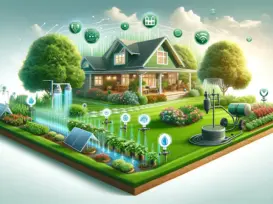Grus Home Energy - sustainable gardening
Sustainable Gardening: Cultivating a Greener Future
Sustainable gardening is a practice that aims to create and maintain a healthy, productive garden while minimizing negative impacts on the environment. By implementing environmentally-friendly practices, gardeners can reduce waste, conserve resources, and protect biodiversity. This approach focuses on creating a self-sustaining ecosystem that benefits both plants and wildlife.
There are several key principles of sustainable gardening that can help gardeners reduce their environmental footprint. One of the most important principles is soil health. Healthy soil is the foundation of a successful garden, providing essential nutrients for plants and supporting a diverse ecosystem of beneficial microorganisms. Gardeners can improve soil health by using organic matter, such as compost and mulch, to feed the soil and improve its structure.
Another important aspect of sustainable gardening is water conservation. By using efficient irrigation methods, such as drip irrigation or rainwater harvesting, gardeners can reduce water waste and promote healthier plant growth. Mulching can also help retain moisture in the soil and reduce the need for frequent watering. Choosing drought-resistant plants and grouping plants with similar water needs together can further reduce water consumption in the garden.
Chemical-free pest control is another key component of sustainable gardening. Instead of relying on synthetic pesticides, which can harm beneficial insects and contaminate the soil and water, gardeners can use natural methods to manage pests. Companion planting, crop rotation, and attracting beneficial insects, such as ladybugs and lacewings, can help control pest populations without the use of harmful chemicals.
Creating habitat for wildlife is also an important aspect of sustainable gardening. By planting a diverse array of native plants, gardeners can provide food and shelter for birds, bees, butterflies, and other beneficial creatures. Building birdhouses, installing bee hotels, and creating pollinator-friendly gardens can help support local wildlife populations and promote biodiversity in the garden.
Composting is another essential practice for sustainable gardening. By recycling kitchen scraps, yard waste, and other organic materials, gardeners can create nutrient-rich compost to feed their plants and improve soil health. Composting also helps reduce waste sent to landfills and decreases greenhouse gas emissions, making it a win-win for both the garden and the environment.
Overall, sustainable gardening is about working with nature to create a healthy, vibrant garden that benefits both people and the planet. By implementing eco-friendly practices, gardeners can reduce their environmental impact, conserve resources, and promote biodiversity in their gardens. Whether you have a small urban plot or a sprawling rural garden, there are many ways to incorporate sustainable gardening principles into your landscape and cultivate a greener future for generations to come.
©2025 All Rights Reserved. Grus IoT Co.,Ltd.
